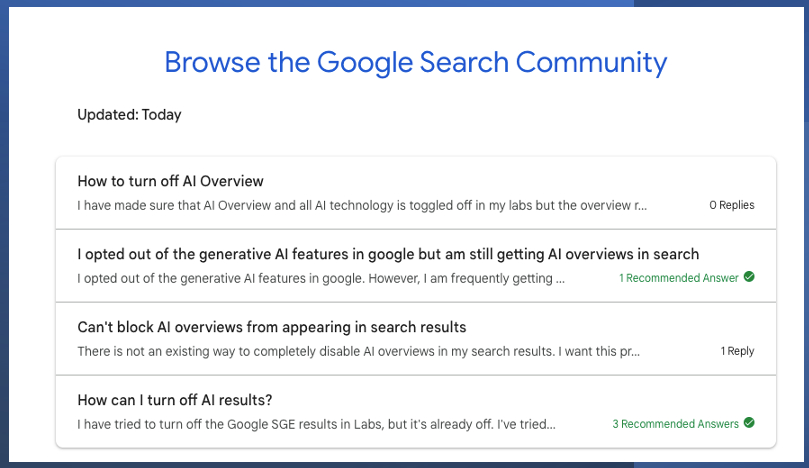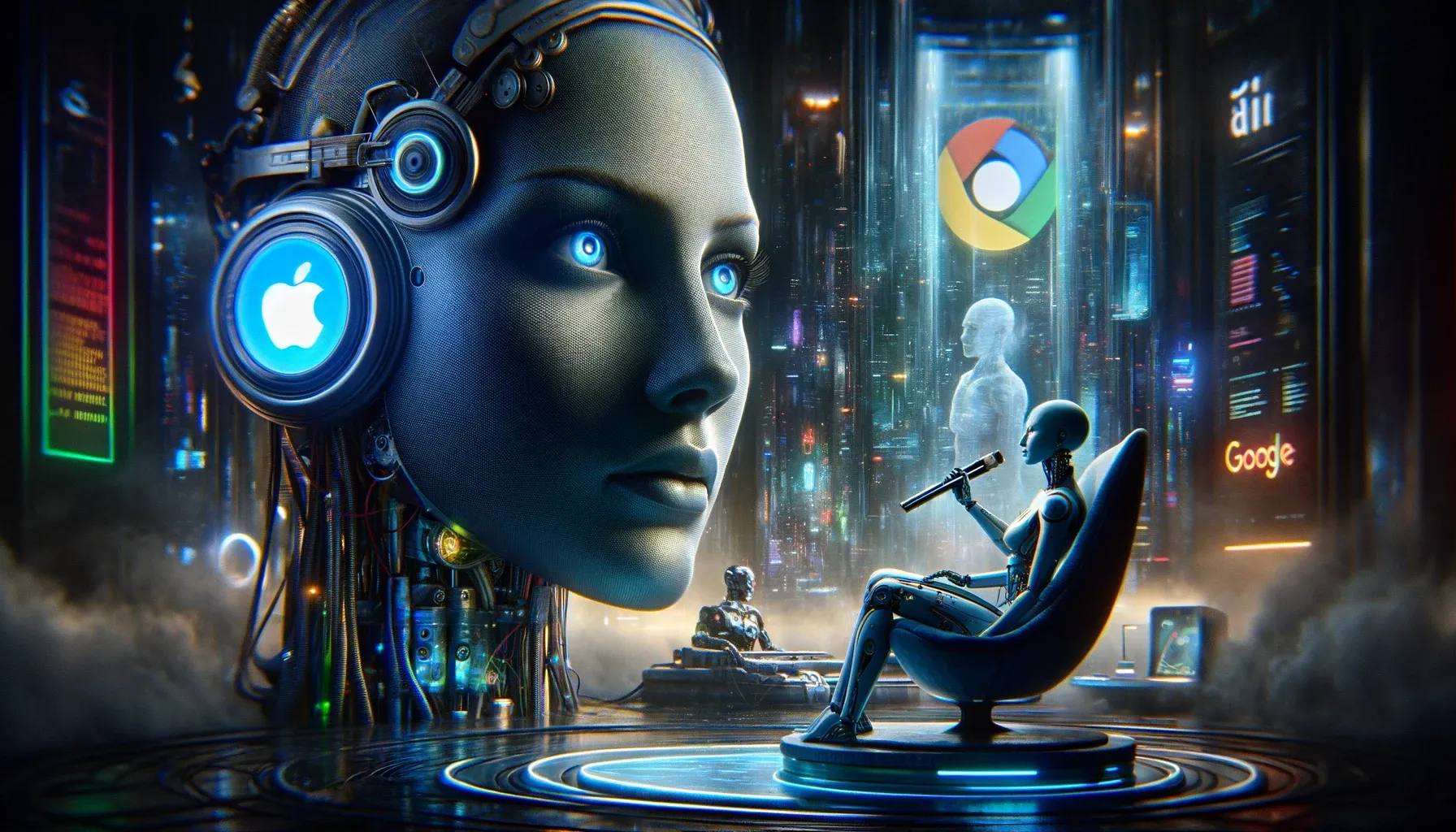AI Overviews Backlash, Siri Do or Die, SERP 'Cognitive Load'

Google AI Overviews Backlash?
Google is formally rolling out AI Overviews (SGE), on a limited basis, to US users this week and to other markets thereafter. CEO Sundar Pichai's statements on Google's most recent earnings call and to CNBC suggest that AI Overviews are a hit and net positive for everyone. He told CNBC, "In general we find it is both overall increasing usage and, when we look at it year on year we have been able to grow traffic to the ecosystem." He added, "The feedback has been great." Obviously, the SEO community doesn't entirely agree. But Pichai's comments would also seem to be at odds with some early public user reactions. A "hide Google AI overviews" Chrome extension has 1,000 users and a 4.9 star rating. And Amsive Digital's Lily Ray points out that Google's search community forum is full of posts asking how to disable AI Overviews (most pre-date Google I/O). Reddit has some of these too. Because we don't yet have any solid empirical data, we don't know how representative these complaints are of the broader reaction to AI Overviews.

Our take:
- Pichai is speaking to the investor community, Google's primary audience, in making these positive claims. And much of it is probably spin.
- Prior to launch Google scaled way back the number of results where SGE appeared. Previously it had been showing for 80%+ of queries.
- Google will likely calibrate AI Overview appearances to public reaction. If there is a backlash of sufficient scale Overviews will appear less often.
Siri's Do or Die Moment
Before Apple bought Siri in 2010, the assistant was being positioned as a kind of Google alternative, a way to connect smartphone users directly to services and content in apps without needing search as middleware. Initially Siri was a great addition to the iPhone. As time has passed, however, development languished as competition advanced. Today, Siri has a negative reputation on balance. (Alexa is weak too.) Afraid of being left behind, Apple has entered into negotiations with Google and OpenAI to license their technology to improve Siri (and other elements of the iOS UX). It appears that OpenAI is getting the deal, although there's been no confirmation. An announcement of a new and improved Siri (and perhaps more) is expected at Apple's June developer conference. This is kind of a do or die moment for Siri. ChatGPT-4o is miles ahead. Apple has been unable to sufficiently develop AI in house to match Google Gemini or OpenAI. For its part, Google sees Android-Gemini integration as a competitive advantage. ChatGPT's upgraded voice assistant, showcased this week, is what Siri could and should have been.

Our take:
- It will be interesting to see what's announced at WWDC and how deeply Apple integrates ChatGPT into iOS.
- In our upcoming podcast, Mike asks which way the money is going. Might OpenAI be paying Apple for distribution? And will ChatGPT get any billing?
- Ultimately Apple needs to own core AI technology. It will likely try to buy one of the smaller companies as a bridge (Stability AI? Mistral?).
SERP Clutter and 'Cognitive Load'
One potential metaphor to describe Google's search UI evolution is: building a house without an architect. Room after room is added without a coherent design or vision. The UI is increasingly cluttered as more modules, carousels, ads, boxes, filters and buttons have been added over the years. Some of this is about technology changes and opportunities and some of it is responding to competition (OpenAI, TikTok, Reddit). Regardless, the amount of mental effort required to evaluate all the information on the page has increased the "cognitive load" of search. Google was once "magical" and simple. No longer. I suspect Google understands this and is rolling out AI Overviews partly to simplify the experience for users. Yet it introduces another element that has to be evaluated: how accurate, complete and/or trustworthy is the AI Overview? The overall UI clutter and corresponding fatigue is partly why some younger users have fled to social media and why others are using AI chatbots. Still others are avoiding ads. In another interesting and parallel development, Google rolled out a "web" filter that just shows links (and ads). No content blocks or carousels.

Our take:
- Web results doesn't avoid ads but it's a much "calmer" SERP. It's also buried typically behind the "more" filter.
- The SERP is a mess partly because Google is responding to competitive pressure rather than pursuing a coherent search product vision.
- Perhaps the most interesting search announcement at I/O was "AI organized" pages, which change by query. This wouldn't address clutter but could offer a better integration and use of AI in the SERP.
Recent Analysis
- Google I/O: Gemini Dominates Search, SGE Goes Live, by Greg Sterling.
- Near Memo episode 156: Is Google finally fixing LSA reviews?; why Google fails; DOJ slide deck details abusive Google ad practices.
Short Takes
- Are service areas now a local ranking factor – maybe yes.
- LSAs: new "message multiple" option seeks to drive more revenue.
- How to improve ranking performance of store locator pages.
- Google Maps will deliver more augmented reality content on phones.
- What's behind the "deranged" one-star reviews on Yelp?
- Expedia readies new AI assistant for travel planning.
- Research: Google not "intentionally biased" against small publishers.
- I/O: Google's broken link to the web and end of search as we know it.
- Google Project Starline video conferencing coming out of labs with HP.
- Now with 40M ad-supported subscribers, Netflix to build own ad tech.
- Study: internet access and use correlated with positive wellbeing.
Listen to our latest podcast.

How can we make this better? Email us with suggestions and recommendations.

